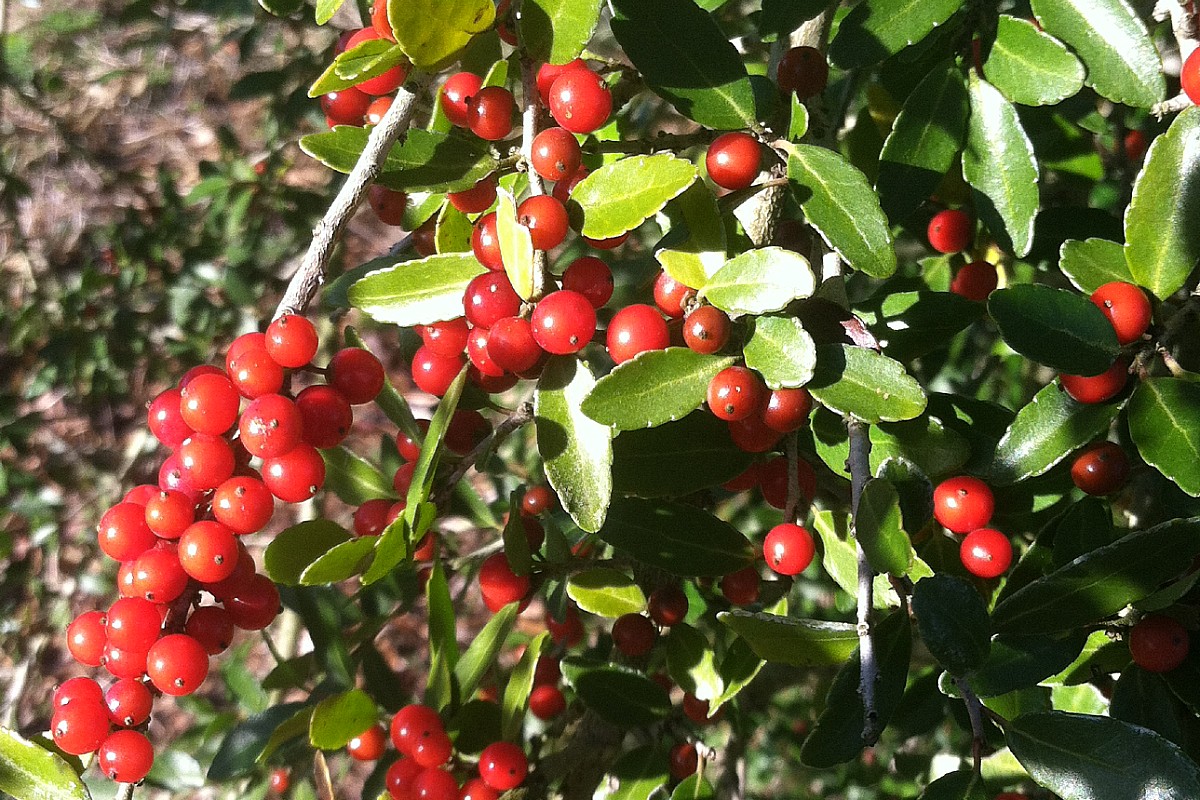By Toni Reale, republished with permission | The yaupon holly is North America’s only plant source of caffeine that grows from the coast of Virginia to Florida and parts of Texas.
According to a professor of food chemistry at Texas A&M University on NPR, the leaves of this plant have approximately the same amount of caffeine as green or black tea. Theobromine, another stimulant found in yaupon, is an alkaloid that is chemically related to caffeine.
Researchers at the University of Navarro found that the combination of theobromine and caffeine as a drink can result in a smoother experience when consumed. Caffeine and theobromine naturally occur in cacao, which is why the consumption of chocolate can lead to an enhanced mood without the jitters. That’s why yaupon holly can be the base of the perfect caffeinated beverage for those who may be sensitive to caffeine, according to a journal article in Frontiers in Pharmacology.
A study done by Texas A&M University scientists found yaupon consumption reduces inflammation and can serve as a chemopreventive, which is a natural way to reduce the risk of cancer or delay its development. Additionally, yaupon contains saponins, a compound known for boosting immunity, lowering cholesterol, aiding in weight regulation, and so much more.
Learn about the Lowcountry’s yaupon
The yaupon holly, an unassuming native evergreen, grows in dense thickets in the maritime forests of the Lowcountry. The size of the plant varies greatly, based on soil conditions and sunlight availability. It can be 4- to 25-feet tall and up to 15-feet wide.
You’ve seen this shrub before. It can be easily identified in the wild by its leaf shape that is fatter in the middle than at the ends. It also has rounded serrated edges that grow in an alternating pattern up the stem. This holly’s almost-impenetrable form of growth provides vital habitats and food for small mammals and birds. The yaupon holly also helps to stabilize eroding landscapes — something of particular importance in the era of escalating climate change and rising seas.
At this time of year, the female yaupon teems with bright red berry-like fruits called drupes. These native bushes grow so prolifically, a hiker would be hard pressed to pass one by without noticing. While it’s the most fitting locally grown greenery to add to holiday arrangements, this plant also has immense health benefits that are making a resurgence in the health and wellness industry.
Why yaupon might not be in your pantry
Yaupon has it all: a buzz without jitters and a long list of splendid health benefits. So why isn’t the tea in everyones’ cabinets? The answer starts with its misleading scientific name: Ilex vomitori. With a name like that, why would anyone choose yaupon over herbal tea or yerba mate?
Yaupon’s species name has historical ties to Native American tribes consuming so much of the “black drink” during ceremonies that they would vomit. Not to worry today: Yaupon is as much of an emetic as coffee or soda, which means the threat of throwing up after consuming it is a non-issue (unless you drink gallons and gallons of it.)
Yaupon’s scientific name, along with significant competition with the annual $203 million yerba mate trade, has significantly impacted this native grown plant’s marketability. Participants in a blind taste test led by a University of Florida undergraduate research student found that even frequent yerba mate drinkers overwhelmingly preferred yaupon tea to mate.
Lowcountry company pushes benefits of yaupon tea, more
Charleston botanist April Punsalan founded Yahola which is a yaupon and herbal tea company. She is passionate about the health benefits of yaupon as well as what developing a new market for this holly would mean for the Lowcountry. She says she sees an opportunity for farmers and landowners to create a new revenue stream with this easily cultivated or foraged product, all the while protecting land from development. Punsalan says she hopes the resurgence of yaupon tea will create a healthier and more prosperous Lowcountry.
The folks at Yahola harvest the yaupon leaves locally to create herbal blends that are for sale on the company’s website. She also offers an online foraging class that encourages students to get outside and harvest medicinal and edible plants locally.
This article was first published in our sister publication, the Charleston City Paper. Toni Reale is the owner of Roadside Blooms, a unique flower and plant shop in Park Circle in North Charleston. Have a comment? Send to: feedback@charlestoncurrents.com





 We Can Do Better, South Carolina!
We Can Do Better, South Carolina!
























